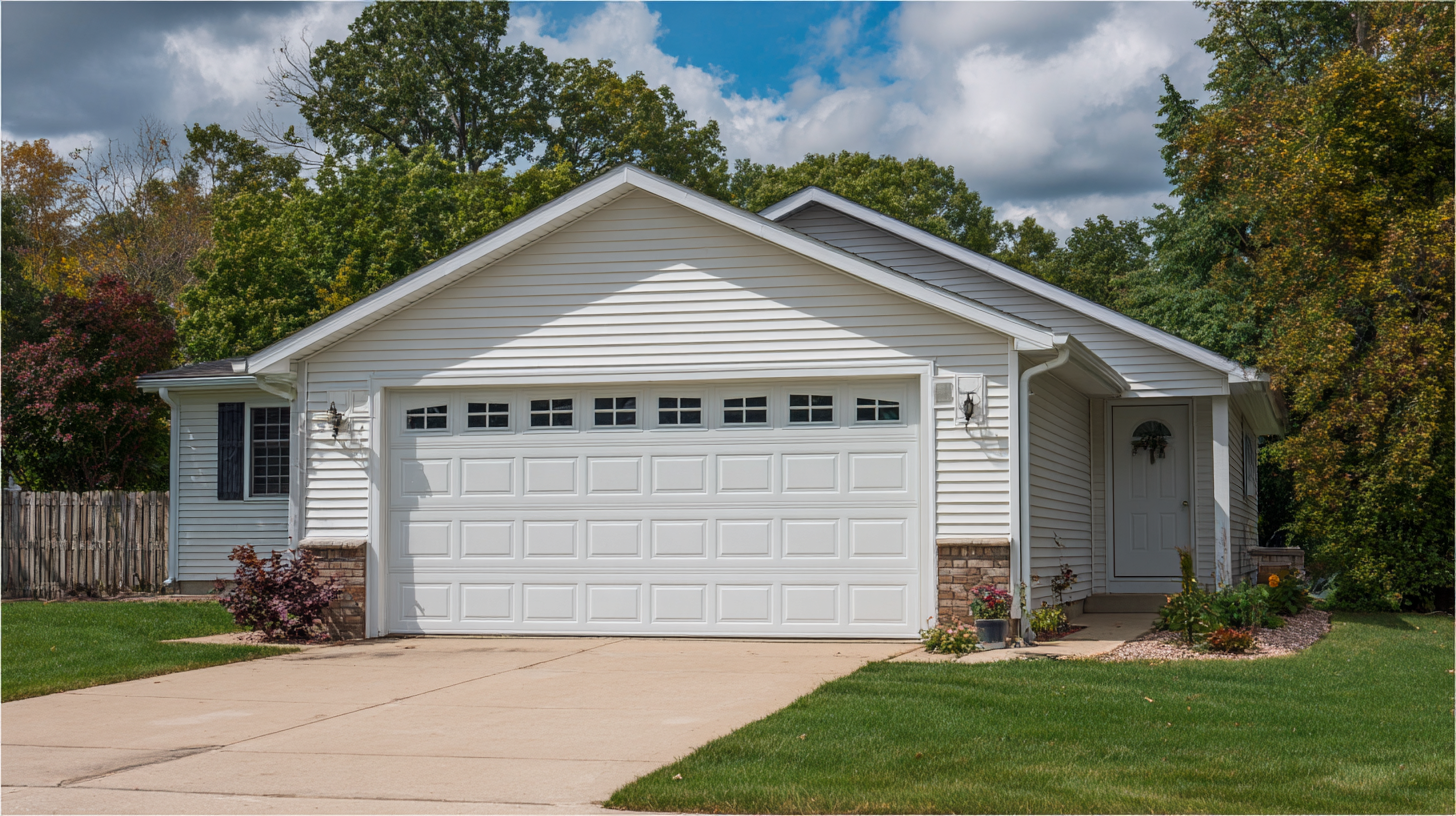In recent years, the demand for energy-efficient home improvements has surged, with insulated overhead garage doors emerging as a popular choice for homeowners looking to reduce energy costs. According to the U.S. Department of Energy, garages can contribute significantly to heat loss, accounting for nearly 15% of energy consumption in homes. By investing in an insulated overhead garage door, homeowners can achieve substantial cost savings; reports indicate that insulated doors can improve energy efficiency by up to 20%. These doors not only help maintain a stable temperature within the garage but also protect adjacent living spaces from temperature fluctuations. As a result, they not only enhance comfort but also aid in lowering heating and cooling bills, making insulated overhead garage doors a smart investment for both new and existing homes.

 Insulated garage doors are designed with advanced materials that significantly enhance energy efficiency. The key to their effectiveness lies in the insulation core, typically made from polystyrene or polyurethane, which provides a barrier against external temperature fluctuations. This insulation minimizes heat transfer, helping to maintain a stable temperature within the garage regardless of the weather outside. By reducing the amount of cold air entering during winter months or keeping heat at bay during summer, insulated doors play a crucial role in energy conservation.
Insulated garage doors are designed with advanced materials that significantly enhance energy efficiency. The key to their effectiveness lies in the insulation core, typically made from polystyrene or polyurethane, which provides a barrier against external temperature fluctuations. This insulation minimizes heat transfer, helping to maintain a stable temperature within the garage regardless of the weather outside. By reducing the amount of cold air entering during winter months or keeping heat at bay during summer, insulated doors play a crucial role in energy conservation.
Furthermore, the benefits extend beyond just thermal regulation. An insulated garage can lead to reduced energy costs over time, as less energy is required to maintain a comfortable environment in adjacent living spaces. This is particularly significant for homes with rooms above or next to the garage, where temperature control is essential. Additionally, the sturdiness of insulated doors helps to reduce noise pollution, creating a quieter home environment. The combination of energy savings and increased comfort makes insulated overhead garage doors a smart investment for homeowners looking to enhance their energy efficiency.
Insulated overhead garage doors provide a multitude of benefits that enhance both energy efficiency and cost savings for homeowners. According to the U.S. Department of Energy, garages represent a significant area for heat loss, especially if they are not adequately insulated. By choosing insulated garage doors, homeowners can reduce energy consumption by up to 25%, as these doors help maintain a stable temperature within the garage, which can also affect the adjacent living areas.
One of the top reasons to invest in insulated overhead garage doors is their ability to improve comfort during extreme weather conditions. Studies from the International Garage Door Association (IGDA) reveal that insulated doors can maintain a more consistent internal garage temperature, making it easier to use the space for various purposes beyond parking vehicles. Furthermore, insulated doors often have a higher R-value, which measures insulation effectiveness, indicating better thermal performance. Additionally, these doors can lead to lower heating and cooling costs; the same IGDA report suggests that homeowners can save around 10-20% on their energy bills after installation. In addition to energy savings, insulated garage doors also provide noise reduction benefits, allowing for a quieter environment both inside and outside the home.
Insulated garage doors play a pivotal role in enhancing the energy efficiency of homes while simultaneously driving down costs. According to the U.S. Department of Energy, insulated garage doors can reduce heat loss in the winter by up to 70%, translating to significant savings on heating bills. With rising energy costs, investing in insulated doors not only contributes to a more comfortable garage environment but also improves overall home value. Furthermore, the upcoming expiration of tax credits for home energy efficiency upgrades may incentivize homeowners to act quickly, as they can recoup up to 30% of the installation costs through the IRS tax credit before the 2025 deadline.
Tips for maximizing your garage's energy efficiency include ensuring that all weatherstripping around the door is intact and replacing any worn seals. A simple DIY project, such as using foam boards for additional insulation, can also make a noticeable difference in keeping temperatures stable. For those considering an insulated garage door, a variety of cost-effective insulation kits are available that can be easily installed, transforming your garage into a more energy-efficient space without breaking the bank. Embracing these solutions not only promotes comfort but also demonstrates a commitment to sustainable living.
| Feature | Standard Garage Door | Insulated Garage Door | Cost Savings (per year) |
|---|---|---|---|
| Energy Efficiency Rating | R-Value: 0-2 | R-Value: 10-18 | N/A |
| Heating Costs | $300 | $150 | $150 |
| Cooling Costs | $200 | $100 | $100 |
| Noise Reduction | Standard | Reduced Noise | N/A |
| Durability | 5-10 years | 15-25 years | N/A |
| Total Annual Savings | N/A | $250 | $250 |
When considering the impact of insulated garage doors on your energy bills, energy audits provide a clear path to understanding potential savings. According to the U.S. Department of Energy, insulated garage doors can reduce heat loss by up to 75%, significantly impacting the overall energy efficiency of your home. This is especially crucial for homes with attached garages, where unregulated temperature can affect adjacent living spaces. By conducting an energy audit, homeowners can identify how much energy their garage is using and assess savings from switching to insulated doors.

Tip: Before making a switch, ensure that your garage door has a minimum R-value of 10, as this indicates better insulation performance.
Additionally, many homeowners don't realize that insulated garage doors also help protect against temperature extremes, ultimately leading to lower heating and cooling costs. The Radiant Barrier Association notes that enhancing your garage’s insulation can prevent over 20% of heating and cooling energy loss in the home. Accessing localized energy consumption data through an energy audit can help you track specific savings after installing insulated doors.
Tip: Consider scheduling an annual energy audit to continually monitor energy efficiency improvements and identify further savings opportunities.
Insulated overhead garage doors offer numerous energy efficiency benefits, but proper maintenance is essential to maximize their lifespan. Regular checks are crucial. Inspect the weather seals around the door, as they can degrade over time, allowing drafts and reducing insulation effectiveness. If you notice any cracks or gaps, replacing these seals can significantly improve your garage’s energy efficiency.
Additionally, lubricating moving parts is vital for ensuring smooth operation and preventing wear. Use a silicone-based lubricant on the rollers, hinges, and tracks at least twice a year. This will help reduce friction and extend the life of your garage door. Be sure also to check the door balance by manually lifting it; if it doesn’t stay open, it may require adjustments to the springs, which is best done by a professional.
Lastly, keeping the door clean not only maintains its appearance but also protects its insulating materials. Use a mild detergent and a soft cloth to clean the surface regularly. This simple step can prevent residue buildup, promoting better insulation properties and prolonging the door's overall lifespan.
This chart illustrates the potential energy savings and cost efficiency when choosing insulated overhead garage doors compared to non-insulated doors.







Since 1984, Thermostop has been a reputable manufacturer of Industrial Sectional Doors, Cold Storage Doors and Specialty Doors such as Impactable Breakaway doors, Acoustic Doors and Ballistic Doors.
Contact